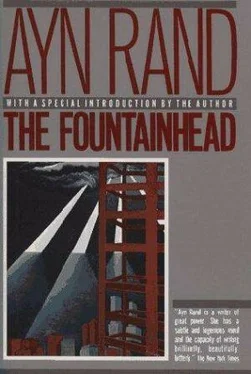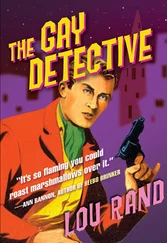"Well, I could say that I must aspire to build for my client the most comfortable, the most logical, the most beautiful house that can be built. I could say that I must try to sell him the best I have and also teach him to know the best. I could say it, but I won't. Because I don't intend to build in order to serve or help anyone. I don't intend to build in order to have clients. I intend to have clients in order to build."
"How do you propose to force your ideas on them?"
"I don't propose to force or be forced. Those who want me will come to me."
Then the Dean understood what had puzzled him in Roark's manner.
"You know," he said, "you would sound much more convincing if you spoke as if you cared whether I agreed with you or not."
"That's true," said Roark. "I don't care whether you agree with me or not." He said it so simply that it did not sound offensive, it sounded like the statement of a fact which he noticed, puzzled, for the first time.
"You don't care what others think — which might be understandable. But you don't care even to make them think as you do?"
"No."
"But that's ... that's monstrous."
"Is it? Probably. I couldn't say."
"I'm glad of this interview," said the Dean, suddenly, too loudly. "It has relieved my conscience. I believe, as others stated at the meeting, that the profession of architecture is not for you. I have tried to help you. Now I agree with the Board. You are a man not to be encouraged. You are dangerous."
"To whom?" asked Roark.
But the Dean rose, indicating that the interview was over.
Roark left the room. He walked slowly through the long halls, down the stairs, out to the lawn below. He had met many men such as the Dean; he had never understood them. He knew only that there was some important difference between his actions and theirs. It had ceased to disturb him long ago. But he always looked for a central theme in buildings and he looked for a central impulse in men. He knew the source of his actions; he could not discover theirs. He did not care. He had never learned the process of thinking about other people. But he wondered, at times, what made them such as they were. He wondered again, thinking of the Dean. There was an important secret involved somewhere in that question, he thought. There was a principle which he must discover.
But he stopped. He saw the sunlight of late afternoon, held still in the moment before it was to fade, on the gray limestone of a stringcourse running along the brick wall of the Institute building. He forgot men, the Dean and the principle behind the Dean, which he wanted to discover. He thought only of how lovely the stone looked in the fragile light and of what he could have done with that stone.
He thought of a broad sheet of paper, and he saw, rising on the paper, bare walls of gray limestone with long bands of glass, admitting the glow of the sky into the classrooms. In the comer of the sheet stood a sharp, angular signature — HOWARD ROARK.
" ... ARCHITECTURE, my friends, is a great Art based on two cosmic principles: Beauty and Utility. In a broader sense, these are but part of the three eternal entities: Truth, Love and Beauty. Truth — to the traditions of our Art, Love — for our fellow men whom we are to serve, Beauty — ah, Beauty is a compelling goddess to all artists, be it in the shape of a lovely woman or a building ... Hm ... Yes ... In conclusion, I should like to say to you, who are about to embark upon your careers in architecture, that you are now the custodians of a sacred heritage ... Hm ... Yes ... So, go forth into the world, armed with the three eternal entities — armed with courage and vision, loyal to the standards this great school has represented for many years. May you all serve faithfully, neither as slaves to the past nor as those parvenus who preach originality for its own sake, which attitude is only ignorant vanity. May you all have many rich, active years before you and leave, as you depart from this world, your mark on the sands of time!"
Guy Francon ended with a flourish, raising his right arm in a sweeping salute; informal, but with an air, that gay, swaggering air which Guy Francon could always permit himself. The huge hall before him came to life in applause and approval.
A sea of faces, young, perspiring and eager, had been raised solemnly — for forty-five minutes — to the platform where Guy Francon had held forth as the speaker at the commencement exercises of the Stanton Institute of Technology, Guy Francon who had brought his own person from New York for the occasion; Guy Francon, of the illustrious firm of Francon & Heyer, vice-president of the Architects' Guild of America, member of the American Academy of Arts and Letters, member of the National Fine Arts Commission, Secretary of the Arts and Crafts League of New York, chairman of the Society for Architectural Enlightenment of the U.S.A.; Guy Francon, knight of the Legion of Honor of France, decorated by the governments of Great Britain, Belgium, Monaco and Siam; Guy Francon, Stanton's greatest alumnus, who had designed the famous Frink National Bank Building of New York City, on the top of which, twenty-five floors above the pavements, there burned in a miniature replica of the Hadrian Mausoleum a wind-blown torch made of glass and the best General Electric bulbs.
Guy Francon descended from the platform, fully conscious of his timing and movements. He was of medium height and not too heavy, with just an unfortunate tendency to stoutness. Nobody, he knew, would give him his real age, which was fifty-one. His face bore not a wrinkle nor a single straight line; it was an artful composition in globes, circles, arcs and ellipses, with bright little eyes twinkling wittily. His clothes displayed an artist's infinite attention to details. He wished, as he descended the steps, that this were a co-educational school.
The hall before him, he thought, was a splendid specimen of architecture, made a bit stuffy today by the crowd and by the neglected problem of ventilation. But it boasted green marble dadoes, Corinthian columns of cast iron painted gold, and garlands of gilded fruit on the walls; the pineapples particularly, thought Guy Francon, had stood the test of years very well. It is, thought Guy Francon, touching; it was I who built this annex and this very hall, twenty years ago; and here I am.
The hall was packed with bodies and faces, so tightly that one could not distinguish at a glance which faces belonged to which bodies. It was like a soft, shivering aspic made of mixed arms, shoulders, chests and stomachs. One of the heads, pale, dark haired and beautiful, belonged to Peter Keating.
He sat, well in front, trying to keep his eyes on the platform, because he knew that many people were looking at him and would look at him later. He did not glance back, but the consciousness of those centered glances never left him. His eyes were dark, alert, intelligent. His mouth, a small upturned crescent faultlessly traced, was gentle and generous, and warm with the faint promise of a smile. His head had a certain classical perfection in the shape of the skull, in the natural wave of black ringlets about finely hollowed temples. He held his head in the manner of one who takes his beauty for granted, but knows that others do not. He was Peter Keating, star student of Stanton, president of the student body, captain of the track team, member of the most important fraternity, voted the most popular man on the campus.
The crowd was there, thought Peter Keating, to see him graduate, and he tried to estimate the capacity of the hall. They knew of his scholastic record and no one would beat his record today. Oh, well, there was Shlinker. Shlinker had given him stiff competition, but he had beaten Shlinker this last year. He had worked like a dog, because he had wanted to beat Shlinker. He had no rivals today ... Then he felt suddenly as if something had fallen down, inside his throat, to his stomach, something cold and empty, a blank hole rolling down and leaving that feeling on its way: not a thought, just the hint of a question asking him whether he was really as great as this day would proclaim him to be. He looked for Shlinker in the crowd; he saw his yellow face and gold-rimmed glasses. He stared at Shlinker warmly, in relief, in reassurance, in gratitude. It was obvious that Shlinker could never hope to equal his own appearance or ability; he had nothing to doubt; he would always beat Shlinker and all the Shlinkers of the world; he would let no one achieve what he could not achieve. Let them all watch him. He would give them good reason to stare. He felt the hot breaths about him and the expectation, like a tonic. It was wonderful, thought Peter Keating, to be alive.
Читать дальше










